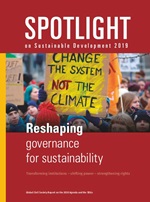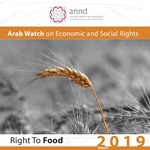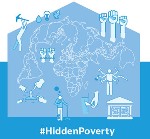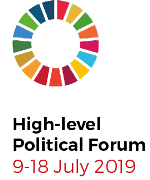Social Watch News
Published on Tue, 2019-09-10 14:55
In the 2030 Agenda for Sustainable Development, UN Member States commited to “reach the furthest behind first”. Can this commitment be applied to governance and related policies, budgets and institutions?
Barbara Adams explores the implications for global governance of the promises of the 2030 Agenda, the practice of the High-level Political Forum (HLPF) and the many and sometimes contradictory approaches and initiatives of the UN system and its ‘governors’.
This analysis highlights the need to move from the current pay-to-play orientation to one of democratic accountability for ‘people and planet’ and recommends a strengthened and re-positioned HLPF and UN General Assembly to drive momentum for the UN as the leader of rights-based multilateralism.
|
Published on Tue, 2019-09-10 14:52
Human rights are explicitly inscribed in the purpose, vision and normative foundations of the 2030 Agenda for Sustainable Development and the Sustainable Development Goals (SDGs). This grounding of Agenda 2030 in human rights standards – a hard-won civil society victory – represents an enormously significant evolution in the historically uneasy relationship between human rights and development in the global governance arena.
If human rights are to help the SDGs “transform our world”, three fundamental steps are needed to disrupt the selectivity and hypocrisy still surrounding the issue in the sphere of global development governance. First, human rights must be articulated and understood holistically, encompassing their economic, social and environmental dimensions, and recognizing their relevance to the entirety of the 2030 Agenda, not just Goal 16 on peaceful and just societies.
|
|
Source: 
. Published on Mon, 2019-09-09 00:00
At the International Statistics Institute World Congress, in Kuala Lumpur, Steve MacFeely, Head of Statistics at UNCTAD, presented a new paper on the opportunities and risks associated with using unofficial statistics to compile SDG indicators.
|
Published on Mon, 2019-09-02 14:57
The right to food is a priority at the global level, and especially in the Arab region where countries with heightened armed conflicts as Syria, Yemen, Iraq and Palestine suffer from severe malnutrition. And yet, conflicts are not the only reason behind the deterioration in the food situation, because it is primarily due to the social and economic policies adopted, as well as climate change and change in production and consumption patterns. In fact, these policies have had a significant impact on small producers and rural populations.
To better understand the setbacks for the right to food, the Arab Watch Report 2019 raises these concerns through 10 national and six regional papers, which all adopt an all-encompassing approach to the right to food and its aspects.
|
Published on Wed, 2019-08-28 16:42
Over a hundred Heads of State or Government are expected to arrive to New York in the last week of September for a series of back-to-back summit meetings at the opening of the General Assembly of the United Nations. On top of the usual photo opportunities and a myriad of bilateral meetings between leaders, this High-level week provides an opportunity for multilateral action to shift away from ‘business as usual’ and address some enormous current challenges.
|
|
Published on Mon, 2019-08-12 14:12
|
Published on Fri, 2019-08-02 14:55
Speaking at the OECD last May, Ambassador David Donoghue, former UN Co-facilitator of the 2030 Agenda, said: “Much is being emphasized about the synergies between the different SDGs, and rightly so, but not much attention is paid to the trade-offs.”
The trade-offs between different priorities competing for scarce budget resources, for the limited attention of policy-makers or the interest of the media rarely emerge in the official debates, but they are permanently highlighted by the independent reports of civil society on implementation of the 2030 Agenda ... or lack of it.
|
Published on Fri, 2019-08-02 14:49
The research report, The Hidden Dimensions of Poverty, fundamentally challenges global conceptions of the nature of poverty. This participatory research, led by ATD-Fourth World and the University of Oxford, has sought to refine the understanding and measurement of poverty by engaging with people directly experiencing poverty, practitioners and academics.
The 2030 Agenda recognizes that poverty is multidimensional. However, apart from income poverty, hitherto these dimensions have not been well-specified, several of them have gone unrecognized, and the ways in which they all interact to shape the experience of poverty has not been properly understood.
|
Published on Tue, 2019-07-30 13:49
Since 2016, 142 countries worldwide have submitted Voluntary National Reviews (VNRs) as part of the UN High Level Political Forum (HLPF), reporting on progress made towards achieving the Sustainable Development Goals (SDGs), the action plan of the 2030 Agenda for Sustainable Development. The VNRs play a prominent role in the annual Economic and Social Council (ECOSOC) HLPF with both criticism and acclaim. However, it’s important to consider how VNRs are taking hold beyond the formal sessions in the HLPF every year. The VNRs elucidate gaps in the global indicator framework and are appearing in discussions of UN Country Teams (UNCTs), the UN Statistical Commission and the Committee for Development Policy (CDP).
|
|
Published on Wed, 2019-07-24 17:41
|
SUSCRIBE TO OUR NEWSLETTER
Submit

|









